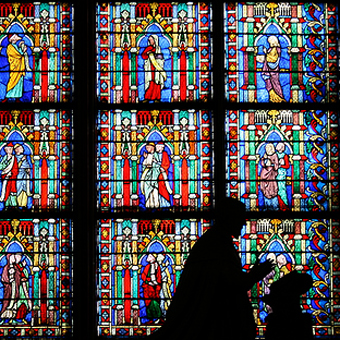Disease and disaster might challenge our belief in God, but despite all that, we must keep the faith.
One of the most memorable moments of my life was when I conferred the sacrament of confirmation on 20 youths in San Francisco’s Children’s Hospital—children ranging from 4 or 5 to 16 years of age who were dying from leukemia. I was apprehensive about how these young ones would feel about receiving confirmation.
When I arrived, I found many of the children bald from chemotherapy and radiation, thin and pale, their faces as white as the pillows on which they lay. I imagined they would be resentful, angry at God for letting them die so young. I thought they might be rejecting God.
Did these children have these feelings? No.
As I anointed their foreheads with the chrism, their faces were peaceful, serious, and with a look of awe realizing that they were receiving a gift from God. What faith!
But today, we are told that religious faith is declining in America. Christopher Hitchens, Richard Dawkins, and Sam Harris have written best-selling books about atheism. Billboards appear in major cities proclaiming that millions of people are living lives that do not need a God.
We live in a world reliant on science, which on one level is good. Science is not an opponent of religious faith. Science and faith are both part of God’s truth. Charles Darwin did not want his discoveries about evolution to diminish faith in God. Albert Einstein believed in a supreme intelligent being. Today popular physicist Stephen Hawking sees God in the laws of the universe. One of the most gifted scientists, Louis Pasteur, once said, “Because I am a scientist, I have the faith of a French peasant; if I continue to study science, someday I may have the faith of a French peasant’s wife.”
There are many challenges to our religious faith. We puzzle about a merciful God and the suffering of innocent people in the earthquakes of China, Haiti, and Chile. Yet even in their suffering, these victims seem to draw closer to God. Through the tear in broken hearts, God is finally seen. God knows the full answer to the suffering of the innocent. We don’t.
And then there is the sexual abuse crisis. This challenges our Catholic faith—and perhaps causes us to lose it. Many of us who are bishops, as leaders in the church, often have been blind, ignorant, and clearly wrong in this crisis. At times we have focused more on the perceived needs of the institutional church than on the needs of the victims. For this we apologize.
I pray that out of this crisis, the church will become better. The church is not the priests and the bishops. The church is the people. And most of all the church is Jesus Christ.
Today, thank God, the church’s ordained leadership is involving the laity more and more, bringing together the experience of parents, academics, scientists, the young, and the old to study new structures in the Catholic Church. Already there are signs of maturing, such as the comprehensive, vigorous programs now installed in all dioceses to ensure the protection of youth. Church leadership is also now wisely inviting candidates for priesthood to begin their formal seminary training after high school, after college, or after work experience, rather than during puberty.
I believe we should consider having a new ecumenical council with representatives of the entire church family, always respecting tradition and sacred scripture, studying more deeply the subjects of human sexuality, the healthy exercise of authority in the church, the needs of the poor and the suffering, the appropriateness of celibacy in the priesthood, the role of women in the church, the need for transparency, and the personal holiness of each one of us.
The church is a living organism. Only lifeless things are static and unchanging. Well-thought-out changes may be necessary in times like these.
To strengthen our faith, we should consider the words of author Carlo Carretto, who writes:
How much I must criticize you, my church, and yet how much I love you!
You have made me suffer more than anyone, and yet I owe more to you than to anyone.
I should like to see you destroyed, and yet I need your presence. You have given me much scandal, my church, and yet you alone have made me understand holiness.
Never in this world have I seen anything more compromised, more false, yet never have I touched anything more pure, more generous, or more beautiful.
Countless times I have felt like leaving you, my church; and yet every night I have prayed that I might die in your warm loving arms.
This article appeared in the August 2010 issue of U.S. Catholic (Vol. 75, No. 8, page 33).















Add comment